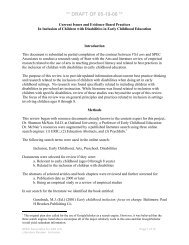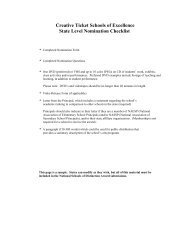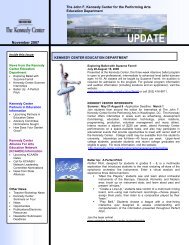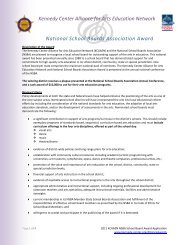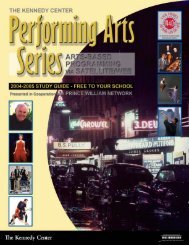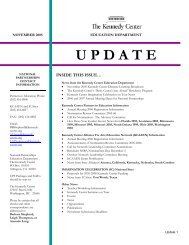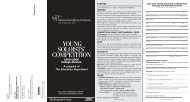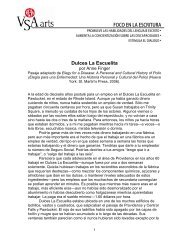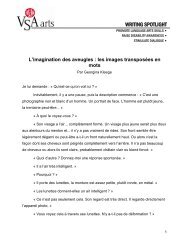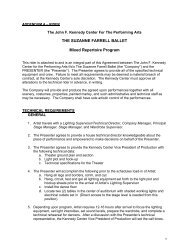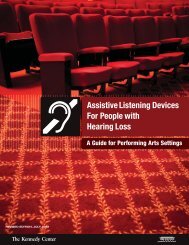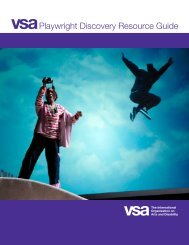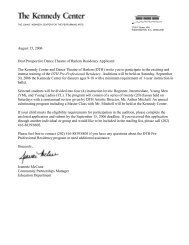Discussion questions and writing activities - John F. Kennedy Center ...
Discussion questions and writing activities - John F. Kennedy Center ...
Discussion questions and writing activities - John F. Kennedy Center ...
You also want an ePaper? Increase the reach of your titles
YUMPU automatically turns print PDFs into web optimized ePapers that Google loves.
WRITING SPOTLIGHT<br />
PROMOTE LANGUAGE ARTS SKILLS •<br />
RAISE DISABILITY AWARENESS •<br />
STIMULATE DIALOGUE •<br />
Poems with Disabilities<br />
By Jim Ferris<br />
<strong>Discussion</strong> Questions<br />
1. “Poems with Disabilities Act” (line 4) calls to mind which civil rights law in the United<br />
States? What do civil rights laws seek to accomplish? What group does this civil<br />
rights law seek to protect? Why do some groups of citizens need the protection of<br />
civil rights laws?<br />
2. Could a poem be considered to need legal protection? Why or why not?<br />
3. Have you ever used a curb cut, the ramp where the sidewalk drops down to curb<br />
level? When do you use it? Why? Have you ever used an electric door opener to<br />
enter a store or school? Investigate how curb cuts <strong>and</strong> door openers became<br />
common features. When did that occur? What motivated the design changes? Who<br />
were they designed to benefit? Who actually benefits from them?<br />
4. Who is speaking in the poem? Who is being addressed? What do you imagine the<br />
circumstances to be? What do we know about the speaker based on what he or she<br />
says? What do we suspect but not know for sure about the speaker?<br />
5. The poem is making a parallel between parking spaces <strong>and</strong> spaces a poem might<br />
occupy in a book. What might make a parking space among the best spaces? Might<br />
different spaces be better under different conditions? Why would some spaces in a<br />
book be considered better than others? Might that change with conditions too?<br />
6. What do you think the speaker means by “those / poems” (line 11)? In what way<br />
could it be considered necessary to keep a space open for that sort of poem?<br />
7. What does it mean to make a “reasonable accommodation” (line 5)? How might one<br />
make a reasonable accommodation for a poem? For a person?
8. What is the poem being compared to in “Poems with Disabilities”? In what ways is a<br />
poem like a car? In what ways is a poem unlike a car? In what ways is a poem like a<br />
person? In what ways is a poem unlike a person?<br />
9. What do you imagine changes in line 18? How does it happen?<br />
10. How is it that a poem could earn one of the “best spaces in the book”? How is it that<br />
the poem in question earns that prime position?<br />
11. What makes this a poem? How would your experience of it be different if it was<br />
simply written out without line breaks?<br />
12. In her poem “Poetry,” the 20th-century American poet Marianne Moore called for<br />
poets to present “imaginary gardens with real toads in them.” In “Poems with<br />
Disabilities,” what is the imaginary garden? And what is the toad?<br />
13. How does the length of each line impact how you experience the line? When you<br />
read the poem aloud, do you speed up, slow down, or pause at the end of the line?<br />
Why do you think the lines become much shorter about halfway through the poem?<br />
Why are the lines at the end the shortest in the poem?<br />
Writing Activities<br />
• Write about a time when people treated you like you didn’t belong someplace even<br />
though you knew you belonged there. How did you know they didn’t think you<br />
belonged? How did you act? How did you feel?<br />
• Poetry has been described as “the art of the unsayable.” Write a poem in response<br />
to this one, in which you try to say the unsayable.<br />
© 2007 James Ferris<br />
VSA arts<br />
An affiliate of the <strong>John</strong> F. <strong>Kennedy</strong> <strong>Center</strong> for the Performing Arts<br />
818 Connecticut Avenue NW, Suite 600 • Washington, DC 20006 • Tel: 202.628.2800 • TTY: 202.737.0645 • Fax: 202.429.0868<br />
www.vsarts.org



